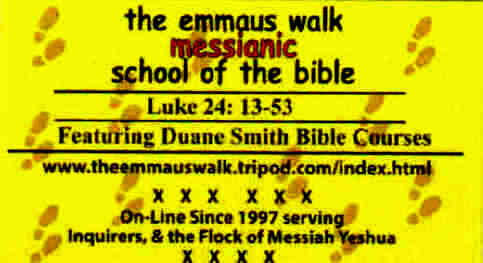THE EMMAUS WALK PRESENTS:

"The Last Prophetic Feast,"
by Pat Robertson,
Excerpt from Frontlines, Oct. 2009

In the Book of Leviticus, we find that God specifically directed Moses concerning three major feasts that correspond to the agricultural seasons: the Feast of Passover, the Feast of Weeks,a nd the Feast of Tabernacles. As we read the New Testament, we discover that all these feasts must be fulfilled before Jesus Christ finished His work on earth.
The first festival, the Passover, was fulfilled whn our Lord was crucified. He was the Passover Lamb. The Apostle Paul told us that Christ, our Passover Lamb, has been sacrificed for us (1 Corinthians 5:7). It is, therefore, by His shed blood that we are covered,a nd our sins are remembered no more. Even as the angel of death passed over the homes of the Israelites who had applied the blood, when God sees the blood of Jesus applied to us, He "passes over" our transgressions and our sins.
Fifty days after the Passover was the Feast of Weeks. In Gree, the festival was named Pentecost since "pente" speaks of the 5oth. It was on the celebration of this day that the power of the Holy Spirit descended upon 120 believers gathered in an upper room, and they were filled with the Holy Spirit. In Christ, these followers of Jesus, the firstfruits, became God's instruments to begin to bring in the final harvest (1 Corinthians 15: 23). But what of the Feast of Tabernacles? We are now in that time of year when our Jewish friends celebrate the end of the agricultural season, and the transition to the new year. It begins with Rosh Hashanah, which means "head of the year." It speaks of the end of one agricultural year, the fulfillment of the last harvest, and the beginning of the new. Then comes Yom Kippur, the Day of Covering, or Day of Atonement. This is when the High Priest would go into the holy of holies and sprinkle blood on the mercy seat, which covered the Ark of the Covenant, for the covering of sins. The New Testament tells us that Jesus Christ was our covering for sin. He is our "lid of covering, our mercy seat."
Five days after this Day of Atonement comes the Feast of Tabernacles. What is God telling us in this? After the Day of Atonement, there were 5 days to gather in the final harvest. In the Bible, the number 5 stands for "grace."
I believe we are no in this period of grace--the final harvest--before the last prophetic feast is fulfilled.
The Feast of Tabernacles is wonderfully symbolic. I was in Israel a few years ago during this feast time, or Succoth as the Jews call it. Everywhere you go, you see the booths or tabernacles that people have built outside their homes. It gives a poignant picture of transition, of being ready to leave where we've been and begin something new. The harvest is finished and a new era is begun. ...I believe it is the only feast that was not fulfilled in the New Testament. Passover had a fulfillment in the crucifixion of Jesus Christ. The Feast of Weeks had a fulfillment in Pentecost. But there has been no fulfillment of the Feast of Tabernacles. Why not? Because it speaks of the Second Coming of Jesus. And when He comes, He's going to set up a magnificent kingdom where there will be no sorrow, no death, no crying, and no pain. And we will reign and rule with the Lord forever and ever.

The Emmaus Walk Home Page
